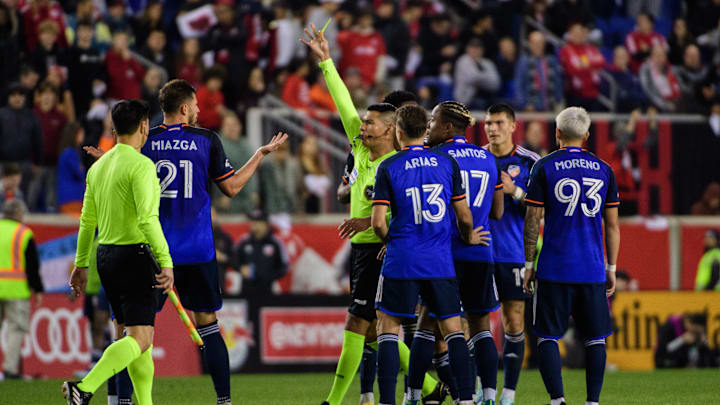The recent weeks have been marked by controversies and disciplinary incidents that shed light on ethical challenges and the constant pursuit of a cleaner game. The MLS Disciplinary Committee has made impactful decisions involving players and coaches from different teams, sparking debates about the integrity of the sport. Let's analyze some of these events and reflect on what it means for the future of American soccer.
Follow MLS Multiplex on Twitter.
Matt Miazga: Misconduct and Behavioral Assessment

FC Cincinnati defender Matt Miazga finds himself at the center of a three-game suspension and an undisclosed fine due to his misconduct after the match against the New York Red Bulls. Additionally, Miazga will undergo a behavioral assessment through the Substance Abuse and Behavioral Health Program (SABH). This incident highlights not only the need for accountability but also the importance of addressing behavioral issues more comprehensively in the sport.
The inclusion of behavioral assessments underscores MLS's effort to address not only the immediate consequences of inappropriate actions but also the underlying causes. Miazga, now facing a period of reflection and potential treatment, emphasizes the growing importance of programs focusing on the mental and behavioral health of players.
Vanni Sartini: A Coach in the Spotlight
Vancouver Whitecaps FC coach Vanni Sartini faces a six-game suspension, a $20,000 fine, and the requirement of a behavioral assessment. The series of violations during and after the Audi MLS Cup Playoffs against LAFC has put Sartini in the spotlight, raising questions about ethics and conduct in the coaching world.
The automatic one-game suspension resulting from the red card received at the 95th minute was followed by an additional five-game suspension due to league policy violations, including entering the field in a confrontational manner and public criticism after the match. This case underscores the need for technical leaders to maintain not only a high professional standard but also to be positive examples for their teams and fans.
Vancouver Whitecaps Players: Fines and Collective Consequences
The mass confrontation during the match against LAFC resulted in fines for several Vancouver Whitecaps players. Goalkeeper Yohei Takaoka, defender Ranko Veselinovic, midfielder Ryan Gauld, and forward Simon Becher received undisclosed penalties for inciting and/or escalating the confrontation. Additionally, coaching staff and other players were fined for entering the field in a confrontational manner.
These collective fines highlight the shared responsibility in maintaining order and respecting the rules of the game. Penalties are not limited to players on the field but extend to the entire team environment, emphasizing the need for a culture that promotes respect and discipline.
Fines for Simulation/Embellishment: A Strong Stance Against Dishonesty
The MLS Disciplinary Committee spared no measures against simulation and embellishment. LAFC defender Jesús Murillo was fined for violating the league policy at the 46th minute of a match against Vancouver Whitecaps FC. New England Revolution's Mark-Anthony Kaye and Columbus Crew's Cucho Hernández also faced fines for not leaving the field promptly and for violating the simulation/embellishment policy, respectively.
These fines highlight a firm stance against dishonesty in the game. In a sport that values fair competition, stringent measures against simulation and embellishment aim to preserve the integrity of soccer and maintain the trust of the fans.
Reflections on the Future of American Soccer
The recent disciplinary incidents in the MLS offer an opportunity for reflection and discussion on the future of American soccer. While penalties aim to correct inappropriate behaviors, it is crucial to also examine the roots of these problems and implement preventive measures.
The inclusion of behavioral assessments is a step in the right direction, recognizing the importance of the mental and behavioral health of players. Furthermore, the rigorous enforcement of penalties for simulation and embellishment highlights the league's commitment to a fair and honest game.
The responsibility falls not only on the players and coaches but also on the leagues, federations, and other stakeholders in promoting an environment where ethics and respect prevail. The quest for a cleaner game must be continuous, aiming not only to correct transgressions but also to cultivate a culture that celebrates integrity and sportsmanship.
